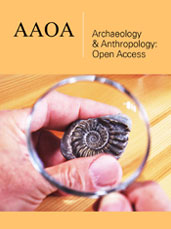- Submissions

Abstract
Archaeology & Anthropology: Open Access
In Defense of Aristotle’s Notion of Eudaimonia as an Activity of Contemplation
-
Open or CloseAtina Knowles*
Faculty of Philosophy, Monmouth University, USA
*Corresponding author: Atina Knowles, Faculty of Philosophy, Monmouth University, USA
Submission: March 20, 2023; Published: April 11, 2023

ISSN: 2577-1949Volume4 Issue5
Abstract
According to Aristotle, “all things aim” at some good and humans are no exception. We, however, recognize an ultimate or “chief good” which we pursue for its own sake, and for whose sake, we seek and do everything else. Aristotle calls this good eudaimonia or happiness and defines it as an “activity of the soul in accordance with excellence” or arete. That philosophers agree on, but there is no consensus as to what Aristotle’s idea of eudaimonia refers to. The two competing interpretations are, that he identifies happiness with “good life” or “faring well”, or that happiness for him is the sole activity of contemplation. The controversy is inspired among other things, by Aristotle’s treatments of eudaimonia in Book I and Book X of Nicomachean Ethics (NE). The proponents of happiness as living well argue that since humans engage in various activities and pursuits throughout their lives, and Aristotle devotes the better part of NE to discussions about the ethical and intellectual virtues, what lives are good, kinds of actions, etc., happiness must be an inclusive goal referring to nested or related in some way pursuits and engagements. They object to the notion of eudaimonia as the single activity of contemplation arguing that the idea allows no role for the ethical virtues rendering them irrelevant and identifying Aristotle’s ethics as amoral at best and possibly immoral. These philosophers argue further that contemplation as outlined by Aristotle is a useless activity and given Aristotle’s view that nature does nothing in vain, such an activity questions even the need for contemplation. Regrettably, the proponents of happiness as an activity of contemplation, only defend the idea by attempting to accommodate the various pursuits humans engage in throughout their lives within a notion of eudaimonia as a single overarching goal and in the end, alter the definition of happiness Aristotle intends or forthright reject it even if unwittingly.
It could be shown however, that the perceived inconsistency of Aristotle’s expositions of happiness is largely premised on the claim that while Aristotle identifies happiness with “good life” or “living well” in Book I, he develops entirely distinct idea of happiness as the singular activity of contemplation in Book X. Even if true, such analyses are almost exclusively premised on the inference that since Aristotle examines various lives considered good in Book I and the ethical virtues throughout NE, he must identify happiness with living a good life and contemplation must be an activity one engages in at will irrespective of one’s character and conduct virtuous or not. There is no indication that Aristotle meant for his notion of contemplation to be interpreted this way and both claims are rooted to some extent, in the misconstruction of Aristotle’s ergon argument which explains why happiness is an activity of the soul and its significance to the idea of eudaimonia. I would like to resist the accusations of confusion and defend Aristotle’s notion of eudaimonia as an activity of contemplation and his ethical theory as a whole. I must insist that there is no inconsistency one can uncover in Aristotle’s expositions of happiness but rather, the discussion of “good life” in Book I sets up the premises from which the conclusion in Book X can be drawn after all the conditions for the attainment of happiness have been examined and outlined in Books II-IX. Eudaimonia as Aristotle envisions it is that which makes a life happy, and cultivating an excellent character is a prerequisite for its attainment. Acting in accordance with excellence requires an excellent character, but to acquire such, one must be willing to endure reasonable hardship for Aristotle as “an excellent life requires exertion and does not consist in amusement”. (NE, 1177a1) I suppose, this is a startling proposition for a Utilitarian, but a proposition one can hardly deny given Aristotle’s emphasis on virtue. And since eudaimonia cannot be attained in the absence of virtuous character which presupposes sustained effort and habituation, even people in fortunate circumstances and of considerable means and wealth, will not attain happiness unless they persevere and are steady in their pursuit of excellent character. Indeed, especially such people since Aristotle shares his doubts about them when he notes that: “…happiness, whether consisting in pleasure or excellence, or both, is more often found with those who are most highly cultivated in their mind and in their character, and have only moderate share of external goods, than among those who possess external goods to a useless extent but are deficient in higher qualities…” (P, 1323b1-5) Eudaimonia in this sense is an award for acquiring virtuous character rather than a product of an activity or an evaluative standard for action and conducting oneself virtuously is how one earns such a reward. As Aristotle explains: “…happiness would then be the prize for those who make themselves and their acts of certain character”. (EE, 1215a18-9) To expose the various misconceptions in various philosophers’ analyses of Aristotle’s notion of happiness and defend it, I will focus on his treatment of happiness in Book I since there is no dispute about Aristotle’s identification of happiness with contemplation in Book X.
Keywords:Contradictory; Ethical works; Hardie’s presumption, Eudaimonia; Investigation
 a Creative Commons Attribution 4.0 International License. Based on a work at www.crimsonpublishers.com.
Best viewed in
a Creative Commons Attribution 4.0 International License. Based on a work at www.crimsonpublishers.com.
Best viewed in 







.jpg)






























 Editorial Board Registrations
Editorial Board Registrations Submit your Article
Submit your Article Refer a Friend
Refer a Friend Advertise With Us
Advertise With Us
.jpg)






.jpg)














.bmp)
.jpg)
.png)
.jpg)










.jpg)






.png)

.png)



.png)






